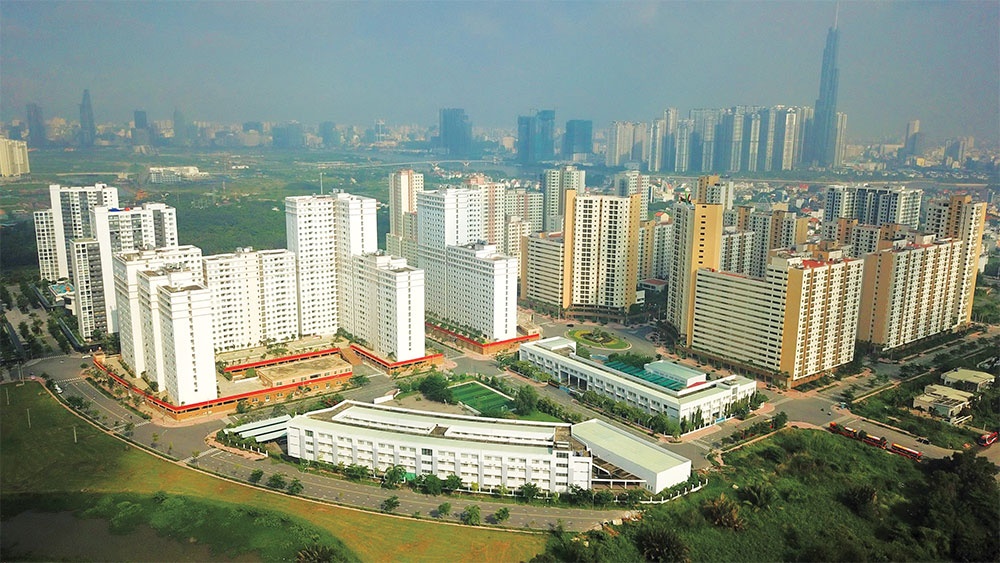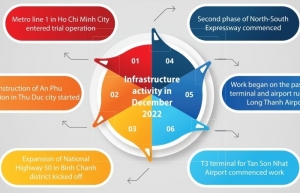Policies taking shape for real estate market overhaul
In the past year new resolutions and decrees have been issued related to policies for the real estate market, which are hoped to officially start impacting the market in 2023.
 |
| A raft of revamped legislation to boost real estate projects has already been issued in the past year, photo Le Toan |
Resolution No.18-NQ/TW, on continuing to improve the effectiveness of land management and use, and create a driving force to develop Vietnam to become a high-income developed country, has defined the specific goal to complete the amendment of the 2013 Law on Land and a number of related laws, ensuring uniformity and consistency.
In December, the government also issued Resolution No.156/NQ-CP on solutions to promote the real estate market safely and sustainably; and Decision No.1435/QD-TTg the previous month set up a working group on reviewing and removing difficulties in implementing real estate projects for both localities and businesses.
Also last month, the prime minister signed Official Letter No.1164/CD-TTg on removing difficulties for the real estate market and housing development. The prime minister requested a review and proposals to amend legal regulations which were overlapping and inadequate, causing obstacles in the implementation of real estate projects.
The prime minister also requested the State Bank of Vietnam to direct, coordinate, and guide localities and commercial banks to lend and disburse quickly, with the correct focus and subjects for loans and disbursements.
Le Hoang Chau, chairman of the Ho Chi Minh City Real Estate Association, said that these timely directions will create fundamental changes to restore and develop the market.
“With these moves, we see that the psychology of businesses and the market is gradually recovering and is more confident to overcome this difficult time. Real estate and related businesses are actively restructuring customer segments, products, prices, and payment terms and methods to be more attractive for end-users,” he said.
Associate professor Tran Dinh Thien, former dean of the Vietnam Economics Institute, said that 2023 will still be tough, but opportunities are also out there, basing this on the fact that the Vietnamese economy has been developed in a stable manner and leads the ASEAN community in many aspects. “However, the real estate market must reduce speculation and restructure investment flow which should be towards affordable properties to serve the majority of the population first, rather than luxury segments,” he said.
Phan Duc Hieu, a standing member of the National Assembly Economic Committee, forecast that the market will have many positive signals based on Vietnam’s economic prospects in 2023.
“The prerequisite is to soon remove the legal and capital bottlenecks, including real estate corporate bonds, and even to have strong solutions to stimulate demand,” said Hieu.
| Dinh Minh Tuan - Director Batdongsan.com.vn South | |
People who want to have a home right away are hunting for suitable products. Real demand (not investment or speculation) is said to be a bright spot to remove difficulties, so investors need to restructure debt and sales policy, and focus all activities on serving customers. To activate cash flow from real buyers, real estate prices need to decrease further. In the short term, prices of some segments in some areas may still level off, and owners who are under pressure of high-interest rates for a long time are forced to sell. This is also the time when the market is attractive enough to activate the bottom-catching cash flow, bring new liquidity, and clear the congested capital flow in the market. Condominiums are a prominent type of real estate to serve real housing needs. The price level of apartments is still increasing in Hanoi, but are almost flat in Ho Chi Minh City. The latest data shows the demand for apartments in Ho Chi Minh City increased steadily, but sale announcement numbers were almost flat over the whole year. Meanwhile, in Hanoi, except for the affordable apartment segment, whose asking price only increased by 2 per cent, the mid- and high-end apartment segment had a price increase of 7-13 per cent compared to the beginning of the year. | |
| David Jackson - CEO, Colliers Vietnam | |
A recalibration of the global real estate market is underway, and the stabilisation may take hold by mid-2023. The velocity and timing of this stabilisation, repricing, and recovery will differ across markets and sectors, resulting in different types of opportunities. Foreign investors, on the one hand, are shifting to defensive strategies due to concerns of inflation, interest rates, increased construction costs, and higher asset operation costs. On the other hand, they are taking this slowdown to ramp up their portfolios, eyeing assets in industrial, office, residential, and retail segments as well as some hospitality properties in Vietnam. With local developers, we expect the restructuring and merger activities to continue in the coming months. Most importantly, real estate businesses are keenly observing the adjustments in the country’s laws and regulations in the coming time. It is now the time for the Vietnamese real estate market to transition to a more sustainable developmental model, benefiting multiple sectors and generating positive values for the economy in the long run. | |
| Nguyen Van Dinh - Chairman, Vietnam Association for Real Estate Realtors | |
There is absolutely a basis to expect a recovery of the real estate market in 2023. The government has made very drastic moves and directed strongly to stabilise the real estate market and create all conditions to help the real estate market develop stably and sustainably. The government has established a working group to study and propose solutions with ministries and local authorities, and will review and work with localities, projects, and investors to remove bottlenecks. With a series of measures the government has introduced, although all are being implemented urgently, it still needs time to come to life. I expect that with specific solutions, the real estate market will operate stably until the first or the second quarter. In addition, investors of projects themselves also have to restructure their operation, customer segments, products, prices, payment terms, and methods which are most suitable to end-users. | |
| Trang Bui - CEO, Cushman and Wakefield Vietnam | |
The mild recession in the last quarter of 2022 will continue into the first quarter of 2023. Vietnam has gone through four real estate cycles, Cushman & Wakefield anticipate that the real estate industry will go through the current economic downturn more quickly than in previous crises, allowing for recovery in the real estate market in the second half of 2023. In the process of working with domestic and foreign investors, we have noticed there is a still strong demand for residential, industrial, retail and logistics. The major office-based organisations appear to be especially reticent about the hybrid workplace strategy and are taking more time to properly understand its impact on the organisation. Next year, we estimated about 140,000 square metres of new office space in Grade A & B in Ho Chi Minh City will enter the market and this is anticipated to ease tension on rents and supply. The government is focusing on regulating middle renting and encouraging home ownership in combination with a strong push for social housing. Increasing housing stock in the middle and lower-end sectors should promote flow and be a crucial link in the housing stock between social rented and owner-occupied housing. Therefore, even in 2023, we expect the housing market to remain under tension. Despite an uncertain economic outlook, retailers continue to seek new physical retail space on sought-after high streets. Investor portfolios are being optimised through relocation and consolidation. This leads to a relatively stable retail rent level, especially in larger shopping cities. The demand for logistics real estate has remained high, despite the current tight market situation and the restrictions on new project developments due to the shortage of plots, building materials and administrative support. In 2023, we forecast that the industrial sector will become the next market leader. | |
| Thang Nguyen - Special Counsel, ACSV Legal | |
The property market has always been attractive to foreign investors due to Vietnam’s vibrant, thriving economy and increasing wealth of the population. The laws on land and residential housing issued in 2013 and 2014 respectively are among the main laws applicable to the property market. However, due to certain restrictions in the legal framework, foreign funding in Vietnam’s property market has not reached the level expected by authorities. Without any significant changes in the aforementioned laws, foreign buyers will face the same restrictions in investing in property in Vietnam. This would include the uncertainty in being able to remit sale proceeds offshore, the inability to purchase numerous residential properties in one area, limited rights and more difficulty in obtaining a property ownership certificate compared to local buyers, and only being entitled to own residential housing but not land use rights. If these questions have not been met, many potential interested parties will be discouraged from entering the Vietnamese market. We will likely not see a significant increase in investment in Vietnam’s residential housing market. Adding the current instability of the global economy into the mix, without strong incentives and increased certainty in the legal framework, foreigners are even less likely to purchase properties outside their home countries unless it is for relocation or immigration purposes. | |
| Su Ngoc Khuong - Senior director Savills Vietnam | |
The state’s tightening of credit and increasing bank interest rates will affect all industries, including production, business, services, construction, and more. In addition, the real estate market has faced legal difficulties for many years. In order for the market to recover strongly, it is necessary to have legal support in project development. We hope that in the near future, these bottlenecks will soon be removed to create a healthier and more favourable business environment for investors as well as solve the housing problem for the majority of people, helping them to access their dream of owning a house at a more reasonable price. Vietnam’s economy will also be greatly affected by the effects of fluctuations in the world such as inflation, exchange rates between foreign currencies, and the scarcity of petroleum and political and social unrest in many countries. In this context, the real estate market also suffers from these economic impacts. Therefore, in 2023, the market will change quite cautiously. In terms of market liquidity, the residential segment will still maintain stably but limited supply and nearly zero of affordable and cheap products reported. Segments such as industrial and office real estate are still doing well and businesses will continue to have a need to expand. |
 | Unique incentives help unlocking real estate capital As the narrowing of capital sources into real estate creates difficulties for project implementation as well as for homebuyers, breakthrough policies are required to open up capital and revive the market. |
 | Public investment to support real estate market It is hoped that extended involvement of public investment into related infrastructure development will help accelerate the prospects of the real estate market. |
What the stars mean:
★ Poor ★ ★ Promising ★★★ Good ★★★★ Very good ★★★★★ Exceptional
Related Contents
Latest News
More News
- Saigon Centre gains LEED platinum and gold certifications (February 12, 2026 | 16:37)
- Construction firms poised for growth on public investment and capital market support (February 11, 2026 | 11:38)
- Mitsubishi acquires Thuan An 1 residential development from PDR (February 09, 2026 | 08:00)
- Frasers Property and GELEX Infrastructure propose new joint venture (February 07, 2026 | 15:00)
- Sun Group led consortium selected as investor for new urban area (February 06, 2026 | 15:20)
- Vietnam breaks into Top 10 countries and regions for LEED outside the US (February 05, 2026 | 17:56)
- Fairmont opens first Vietnam property in Hanoi (February 04, 2026 | 16:09)
- Real estate investment trusts pivotal for long-term success (February 02, 2026 | 11:09)
- Dong Nai experiences shifting expectations and new industrial cycle (January 28, 2026 | 09:00)
- An Phat 5 Industrial Park targets ESG-driven investors in Hai Phong (January 26, 2026 | 08:30)







 Tag:
Tag:



















 Mobile Version
Mobile Version